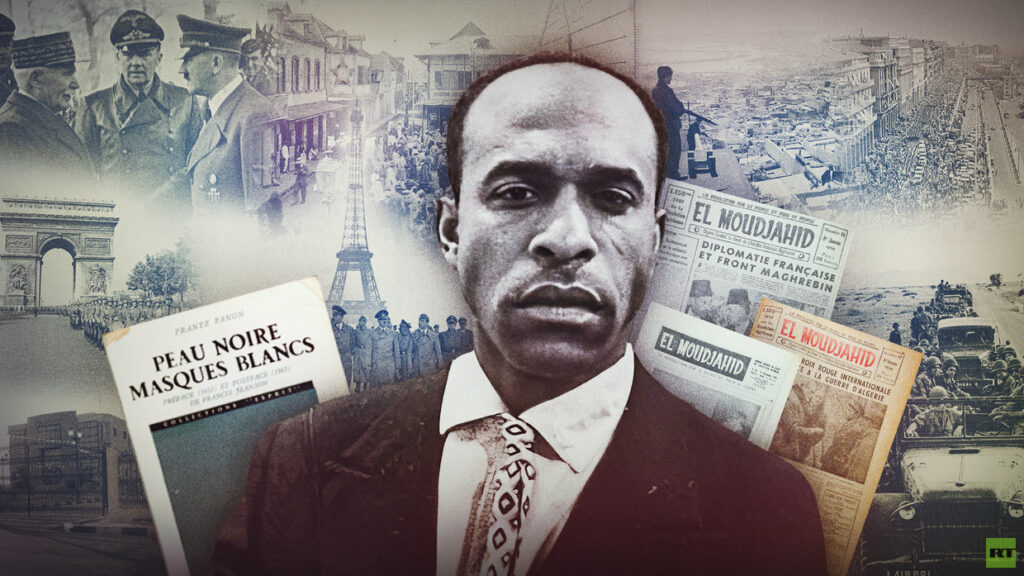Black Skin, White Masks: This Man Wanted to Cure the Disease of Colonialism
AFRICA, 20 Jan 2025
Tamara Ryzhenkova | RT - TRANSCEND Media Service
Frantz Fanon is considered a legend of the anticolonial movement not only in Algeria, but all over the world.
13 Jan 2025 – On December 6, 1961, Frantz Fanon, an Afro-Caribbean thinker and psychiatrist, died of a serious illness in the US state of Maryland. A member of the French Resistance who was awarded the Croix de Guerre, Fanon is as significant as he is controversial in the intellectual legacy of anti-colonialism.
He lived for only 36 years, but in his short, hard-working, and tragic life, he managed to write a number of works that inspired revolutionaries in Africa, Asia, and Latin America, and also initiated research in the field of postcolonialism.
Fanon’s body rests in a cemetery for freedom fighters (Chouhada) in Ain Kerma in eastern Algeria, a country for which the Caribbean philosopher was of particular importance.
During the Algerian War against the French colonialists (1954-1962), Fanon joined the Algerian independence movement as practicing physician and became an editor of the newspaper El Moudjahid, which was published by the National Liberation Front (FLN). He was the FLN’s main ideologist and played a significant role in its activities.
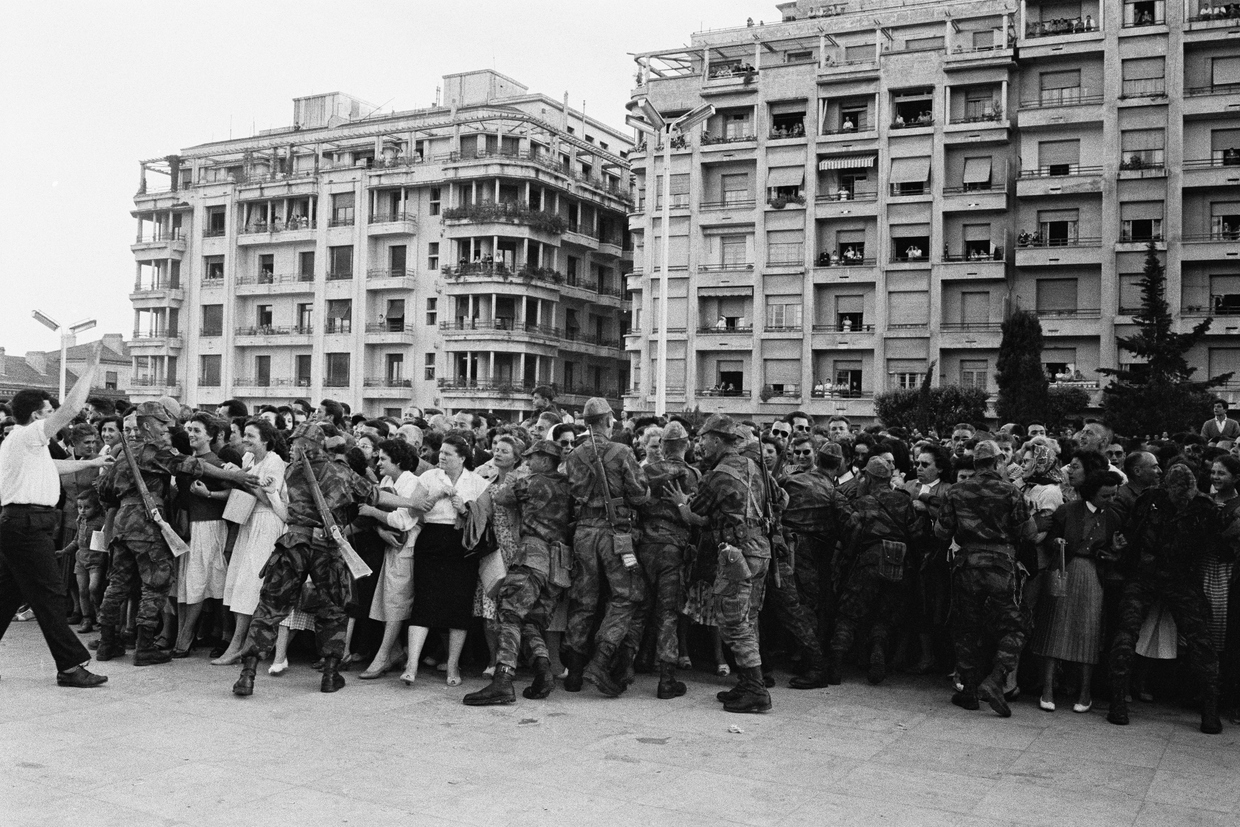
Early Years in Martinique
Frantz Fanon was born on July 20, 1925, in Fort de France on the island of Martinique in the Caribbean Sea, which is still one of France’s five overseas departments. He was the fifth of eight children. His father was the descendant of African slaves and worked as a customs inspector, and his mother, who had mixed French and Afro-Caribbean roots, was a shopkeeper.
Since his family belonged to the petty bourgeoisie, they provided Frantz with a good education. In Martinique, he studied at the most prestigious educational institution, the Lycee Victor Schoelcher. In high school, he became a devoted visitor of the Lyceum library, where he enthusiastically read Renaissance writers. It was here that he also studied with Aime Cesaire, a famous poet and one of the founders of the concept of Negritude, which is based on the idea of the identity of the black race.
Second World War and Racism
Fanon managed to earn a secondary education diploma only after taking part in combat in the Second World War, and it was during this period that his anti-colonial beliefs finally formed.
After the French Third Republic surrendered to Nazi Germany in July 1940, Martinique came under the control of forces loyal to the collaborationist Vichy regime. The United States’ subsequent naval blockade of Martinique in 1943, as well as the disruption of imports from France, led to an acute shortage of food on the island.
Given these conditions, the Vichy authorities began to harshly repress local supporters of the Allies and practiced racial violence. Fanon, who had witnessed extreme forms of colonial racism, fled Martinique at the age of 18 and traveled to the British colony of Dominica, where he joined the French Resistance forces under the command of Charles de Gaulle.

After the Allied Normandy landings, Fanon participated in liberating France as part of the French Army. He was seriously wounded in 1944 during battles in Alsace, after which he was awarded the Croix de Guerre.
However, after the German troops were driven out of France and the Allied forces crossed the Rhine and entered Germany, Fanon and other black soldiers were sent south to Toulon as part of de Gaulle’s policy of removing soldiers from the French Army based on race.
Fanon was extremely disappointed by the racism he witnessed during the war. Afterwards, he described the events he lived through as “a war between whites, which in no way concerns the colonized.” At the same time, Fanon insisted that when freedom is involved, all nations are involved in the struggle, regardless of skin color.
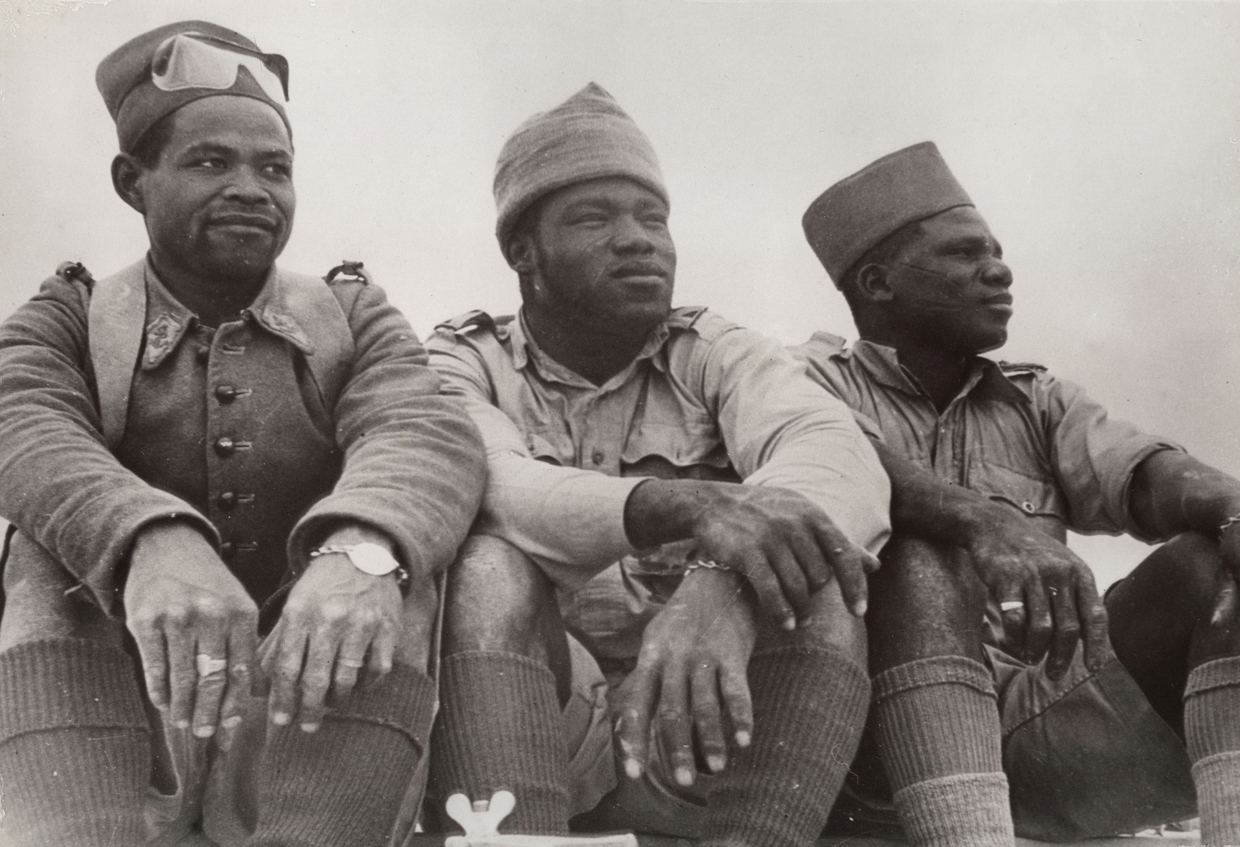
Fanon was demobilized on May 18, 1945, and returned to his homeland on September 12, where he received a scholarship for combat participants. Here, in Martinique, he took an active part in the election campaign of his teacher, Aime Cesaire, who ran for the National Assembly of the French Fourth Republic as a candidate from the Communist Party.
‘The Black Man, Slave of His Inferiority, and the White Man, Slave of His Superiority’
After receiving his bachelor’s degree, Fanon moved to France, where he began studying medicine and psychology at the University of Lyon, and also attended lectures on philosophy, literature, and drama. Among his teachers and mentors was the famous Catalan psychiatrist Francesc Tosquelles, one of the founders of institutional psychotherapy, as well as French phenomenological philosopher Maurice Merleau-Ponty. After graduating with a degree in psychiatry in 1951, Fanon began working in his field.
In 1952, at the age of 27, Fanon wrote and published his first book in France – ‘Black Skin, White Masks’. This was originally intended to be a doctoral dissertation titled ‘Essay on the Disalienation of the Black’, but it had been rejected by the academic council of the University of Lyon. The work contained a psychoanalysis of the negative impact of colonial enslavement and described an oppressed black man who is perceived as an inferior being in the white world as follows:
“All it needs is one simple answer and the black question would lose all relevance.
What does man want?
What does the black man want?
Running the risk of angering my black brothers, I shall say that a Black is not a man.”
As a sophisticated psychoanalyst, Fanon notes that colonial enslavement negatively affects both the colonizer and the victim:
“Both the black man, slave to his inferiority and the white man, slave to his superiority, behave along neurotic lines. As a consequence, we have been led to consider their alienation with reference to psychoanalytic descriptions.”
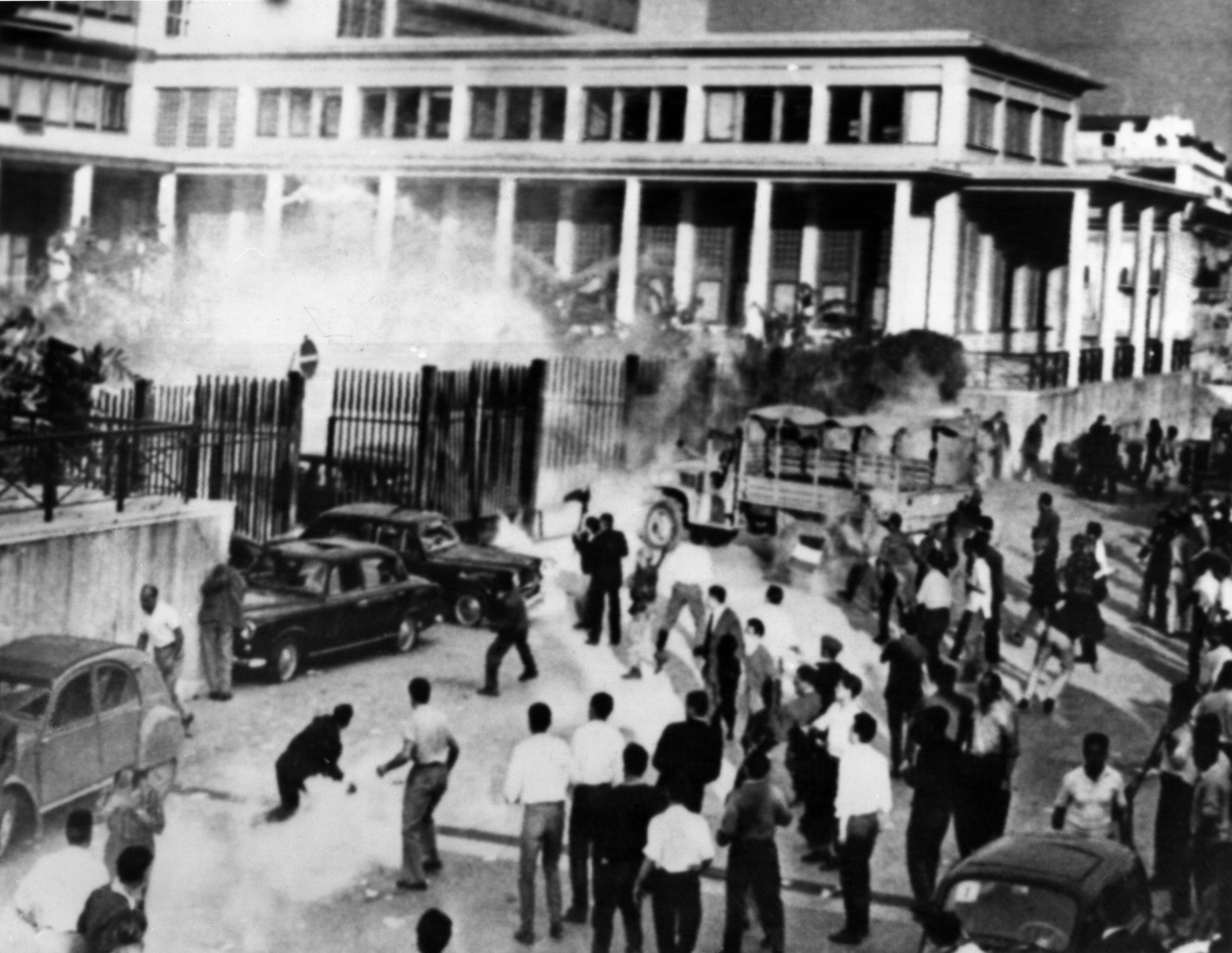
Another topic touched upon is the colonizer’s language, whose use reflects the dependence and subordination for the enslaved people.
“All colonized people – in other words, people in whom an inferiority complex has taken root, whose local cultural originality has been committed to the grave – position themselves in relation to the civilizing language: i.e., the metropolitan culture.”
This book also shows the formation of Fanon’s ideas, which would greatly influence the leaders of national liberation movements in the future:
“Intellectual alienation is a creation of bourgeois society. And for me bourgeois society is any society that becomes ossified in a predetermined mold, stifling any development, progress, or discovery. For me bourgeois society is a closed society where it’s not good to be alive, where the air is rotten and ideas and people are putrefying. And I believe that a man who takes a stand against this living death is in a way a revolutionary.”
’There Comes a Time when Silence Becomes Dishonesty’
Due to a lack of vacancies, Fanon soon tried to get a job in one of the countries of sub-Saharan Africa, but eventually joined the chef de service at the Blida-Joinville Psychiatric Hospital in Algeria. He arrived there in December of 1953, about a year before the Algerian War of Independence broke out on November 1, 1954.

In fact, Fanon went from one colonized country, Martinique, to another occupied by the same colonial power. Working as a psychiatrist in contact with patients, nurses, and interns, he soon saw the psychological effects of colonialism not only on its oppressed and tortured victims, but also on the French soldiers and officers who used torture to quell anti-colonial resistance. Fanon was responsible for treating the psychiatric disorders of both.
In 1955, he met Pierre Chaulet, a French-Algerian doctor who had worked with the National Liberation Front during the war. This acquaintance influenced Fanon’s subsequent decision to join the Algerian freedom fighters.
By the summer of 1956, Fanon realized that he could no longer cooperate with the French authorities, even indirectly, working at the hospital. He decided to leave medical practice and wrote his famous ‘Letter of Resignation to the Resident Minister’, which later became an influential text in anti-colonialist circles.
“There comes a time when silence becomes dishonesty. The ruling intentions of personal existence are not in accord with the permanent assaults on the most commonplace values. For many months my conscience has been the seat of unpardonable debates. And the conclusion is the determination not to despair of man, in other words, of myself. The decision I have reached is that I cannot continue to bear a responsibility at no matter what cost, on the false pretext that there is nothing else to be done,” Fanon wrote.
As for colonialism, he said the following in this letter:
“I can say that, standing at this crossroads, I was horrified to measure the degree of alienation of the inhabitants of this country. If psychiatry is a medical technique that aims to give a person the opportunity to no longer feel alienated from their surroundings, I must say that an Arab, forever alienated from his country, lives in a state of absolute depersonalization.”
In response to Fanon’s resignation, the colonial authorities decided to expel him from Algeria, and he went to Tunisia, where he openly joined the FLN and worked as an editor at El Moudjahid, for which he wrote articles for the rest of his life.
Fanon often led FLN diplomatic missions, representing the Algerian resistance in sub-Saharan Africa. During this period, he traveled with a passport issued by the Kingdom of Libya in the name Ibrahim Omar Fanon.
In 1960, shortly before his death, the Interim Government of Ahmed Ben Bella appointed Fanon as its ambassador to Ghana, and in this capacity, he attended conferences in Accra, Conakry, Addis Ababa, Leopoldville (now Kinshasa), Cairo, and Tripoli.
Fanon’s Legacy
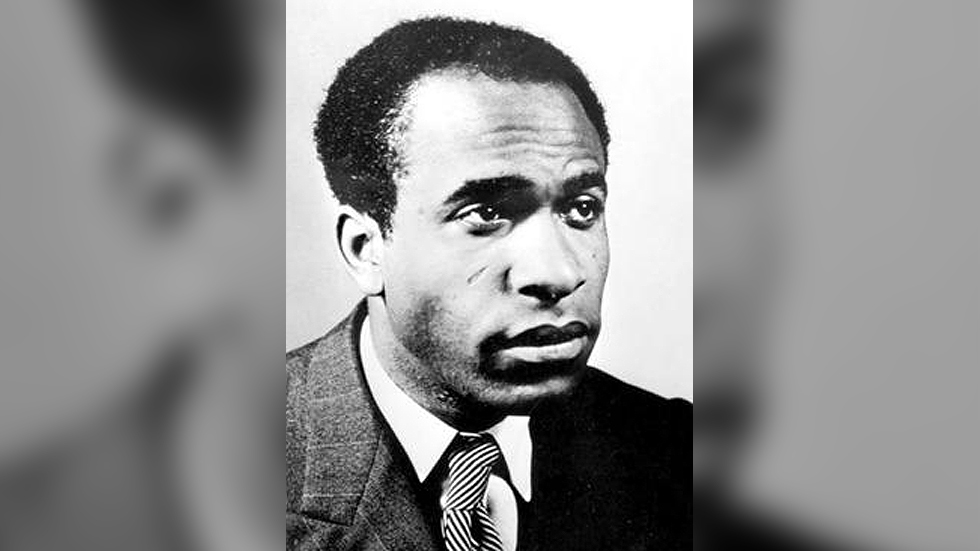
Upon returning to Tunisia after one of his grueling work trips across the Sahara, Fanon was diagnosed with leukemia. He was initially treated in the USSR, where he went into remission, after which he returned to Tunisia. In his last months, he gave lectures for officers of the Algerian National Liberation Army on the Algerian-Tunisian border.
However, the disease did not go away, and his friends recommended that he go to the United States for treatment. Frantz Fanon died on December 6, 1961, in Bethesda, Maryland, from bilateral pneumonia after beginning cancer treatment, albeit too late. He was interned in the tomb of the martyrs in Ain Kerma in eastern Algeria under the name Ibrahim Frantz Fanon.
The book ‘Black Skin, White Masks’ was the first serious work in which Fanon was able to use tools from various fields of knowledge, including psychoanalysis, philosophy, linguistics, literature, and early concepts of negativity, to analyze the state of neurosis caused by colonialism. ‘Black Skin, White Masks’ is a basic introduction to understanding the multiple levels of colonial oppression.
His later works reflect his experiences in Algeria and sub-Saharan Africa. His controversial ‘The Wretched of the Earth’ from 1961 is addressed mostly to Algerians, whose will to struggle for freedom he actively supported. In a book that the French government censored, Fanon radically defends the right of colonized peoples to use violence. According to the author, since France’s occupation of Algeria was based purely on military coercion, any resistance should also be violent, since the colonialists only understand the language of force.
“In the colonial countries, on the contrary, the policeman and the soldier, by their immediate presence and their frequent and direct action maintain contact with the native and advise him by means of rifle butts and napalm not to budge. It is obvious here that the agents of government speak the language of pure force.”
Fanon eventually calls the US the amalgamation of all the evils of Europe:
“Two centuries ago, a former European colony decided to catch up with Europe. It succeeded so well that the United States of America became a monster, in which the taints, the sickness, and the inhumanity of Europe have grown to appalling dimensions.”
_______________________________________________
Tags: Africa, Anglo America, Anti-imperialism, Colonialism, Colonization, Decolonization, Europe, Frantz Fanon, History, Latin America Caribbean, Neocolonialism, Slavery
DISCLAIMER: The statements, views and opinions expressed in pieces republished here are solely those of the authors and do not necessarily represent those of TMS. In accordance with title 17 U.S.C. section 107, this material is distributed without profit to those who have expressed a prior interest in receiving the included information for research and educational purposes. TMS has no affiliation whatsoever with the originator of this article nor is TMS endorsed or sponsored by the originator. “GO TO ORIGINAL” links are provided as a convenience to our readers and allow for verification of authenticity. However, as originating pages are often updated by their originating host sites, the versions posted may not match the versions our readers view when clicking the “GO TO ORIGINAL” links. This site contains copyrighted material the use of which has not always been specifically authorized by the copyright owner. We are making such material available in our efforts to advance understanding of environmental, political, human rights, economic, democracy, scientific, and social justice issues, etc. We believe this constitutes a ‘fair use’ of any such copyrighted material as provided for in section 107 of the US Copyright Law. In accordance with Title 17 U.S.C. Section 107, the material on this site is distributed without profit to those who have expressed a prior interest in receiving the included information for research and educational purposes. For more information go to: http://www.law.cornell.edu/uscode/17/107.shtml. If you wish to use copyrighted material from this site for purposes of your own that go beyond ‘fair use’, you must obtain permission from the copyright owner.
Join the discussion!
We welcome debate and dissent, but personal — ad hominem — attacks (on authors, other users or any individual), abuse and defamatory language will not be tolerated. Nor will we tolerate attempts to deliberately disrupt discussions. We aim to maintain an inviting space to focus on intelligent interactions and debates.
